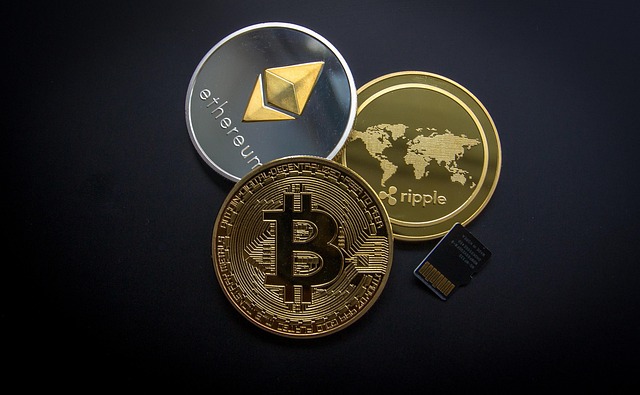Crypto Wallets: A Comprehensive Guide
Author: Jameson Richman Expert
Published On: 2025-05-14
Prepared by Jameson Richman and our team of experts with over a decade of experience in cryptocurrency and digital asset analysis. Learn more about us.
A crypto wallet is essential for anyone looking to invest or trade in cryptocurrencies. This article will delve into the various types of crypto wallets available, their functionalities, and the best practices for securing your digital assets. Understanding crypto wallets is the first step towards managing your investments in the ever-evolving landscape of digital currencies.
When you begin your journey into the world of cryptocurrencies, understanding the role of a crypto wallet is fundamental. These wallets are not just storage solutions; they are gateways to participating in the vast ecosystem of digital assets. As the popularity of cryptocurrencies continues to surge, so does the need for secure and efficient methods of managing these digital currencies. Crypto wallets come in various forms, including hardware wallets, software wallets, and even paper wallets, each offering unique advantages and disadvantages.

Understanding Crypto Wallets
At its core, a crypto wallet is a digital tool that allows users to store and manage their cryptocurrencies. Unlike traditional wallets, crypto wallets don't store the actual currency; instead, they hold the public and private keys necessary to access your cryptocurrency on the blockchain. This means that while your physical coins are not stored in the wallet, you do have access to them through your wallet's keys.
The two main types of wallets are hot wallets and cold wallets. Hot wallets are connected to the internet and are more convenient for frequent transactions, making them suitable for traders and those who regularly engage with their cryptocurrencies. Cold wallets, on the other hand, are offline storage solutions that are considered more secure but less convenient for quick access. It’s crucial to assess your personal needs and security preferences when choosing the right wallet for you.
Types of Crypto Wallets
Crypto wallets can be categorized based on their functionality and security features. Here are the primary types:
- Software Wallets: These are applications that you can download on your computer or smartphone. They provide user-friendly interfaces and are ideal for everyday transactions. However, they are also vulnerable to online attacks and malware, which makes them less secure than other options. Examples include Exodus, Atomic Wallet, and Electrum.
- Hardware Wallets: These are physical devices that store your keys offline. They are considered the most secure option since they are not connected to the internet, making them less susceptible to hacking and phishing attacks. Examples include Ledger Nano S, Trezor Model T, and KeepKey.
- Paper Wallets: This is a physical printout of your public and private keys. While they are immune to online threats, they can be easily lost or damaged. It is crucial to store them securely, such as in a safe or safety deposit box. Tools like WalletGenerator.net can be used to create paper wallets.
- Web Wallets: These wallets are hosted in the cloud and can be accessed from any device with an internet connection. They are convenient but rely on third-party security measures, making them potentially less secure than other options. Examples include Coinbase, Blockchain.info, and Crypto.com.
- Mobile Wallets: Designed for smartphones, these wallets offer convenience for quick transactions. They are ideal for users who regularly engage with their cryptocurrencies for payments but may expose users to security risks if the device is compromised. Popular mobile wallets include Trust Wallet, Mycelium, and Coinomi.
Choosing the Right Wallet
When it comes to choosing the right crypto wallet, it’s important to consider several factors:
- Security: Security should be your top priority. Hardware wallets like Ledger and Trezor provide enhanced security features, which can be crucial for safeguarding your investments. Software wallets are suitable for smaller amounts or frequent transactions, but be mindful of their vulnerabilities.
- User Interface: A wallet that is difficult to navigate can lead to mistakes that might cost you your assets. Look for wallets that offer a comprehensive and intuitive user experience, with features that suit your needs.
- Customer Support: Consider wallets that provide robust customer support, so you can get assistance if needed. Good customer service can be invaluable, especially during critical situations.
- Fees: Be aware of the fees associated with each wallet. Some wallets charge for transactions, while others are free. This can impact your trading strategy and overall costs. Always review the fee structure before committing to a wallet.

Best Practices for Securing Your Wallet
Securing your crypto wallet is crucial to protecting your digital assets. Here are some best practices:
- Enable Two-Factor Authentication (2FA): This adds an extra layer of security by requiring a second form of verification when logging in. Apps like Google Authenticator or Authy can help with this.
- Use Strong Passwords: Ensure your wallet password is complex and unique to prevent unauthorized access. Use a mix of letters, numbers, and symbols, and consider using a password manager.
- Backup Your Wallet: Regularly backup your wallet and store the backup in a secure location. This ensures you won’t lose access if something goes wrong. Make sure to encrypt your backup if possible.
- Keep Your Software Updated: Regular updates can protect against vulnerabilities that hackers may exploit. This includes both your wallet software and your device’s operating system.
- Be Wary of Phishing Attacks: Always double-check URLs and email addresses to ensure you are dealing with legitimate sites and services. Use bookmarks for frequently visited sites to avoid typos.
Popular Crypto Wallets
Several crypto wallets have gained popularity due to their features and user experiences. Here are a few worth considering:
- Binance Wallet: Binance offers a secure wallet integrated with its trading platform. You can register for an account using this link, which provides you access to an extensive range of cryptocurrencies and trading options.
- MEXC Wallet: MEXC provides an invite code that users can utilize when registering, which can be found here. This wallet is designed for convenience and supports numerous digital assets.
- Bitget Wallet: Bitget offers a user-friendly platform for trading and storing cryptocurrencies. You can sign up using this link, making it easy to get started with their services.
- Bybit Wallet: Bybit is known for its trading capabilities, and its wallet features a robust security system. You can register using this link to begin trading and managing your crypto assets efficiently.
- Exodus Wallet: Exodus is a software wallet that offers a visually appealing interface and supports numerous cryptocurrencies. It also provides an inbuilt exchange feature, allowing users to trade assets within the wallet.
The Future of Crypto Wallets
As the cryptocurrency market continues to evolve, so do the technologies behind crypto wallets. We can expect to see advancements in security features, user interfaces, and integrations with decentralized finance (DeFi) platforms. For a deeper understanding of where cryptocurrency is heading, check out this insightful article on the future of cryptocurrency.
Moreover, as new coins and tokens emerge, the need for wallets that can manage multiple assets will become increasingly important. For those interested in which coins might experience significant growth, this article about top crypto coins set to explode in 2025 is worth reading.

The Role of AI in Wallet Management
Artificial Intelligence is beginning to play a significant role in the management of crypto wallets. AI-powered trading bots are becoming increasingly popular among traders looking to automate their trading strategies. They analyze market trends and execute trades based on predefined criteria, which can significantly enhance trading efficiency. For more insights into how AI is changing the trading landscape, refer to this article about AI trading bots.
Conclusion
In conclusion, understanding and utilizing crypto wallets is a vital step for anyone looking to engage with cryptocurrencies. By choosing the right wallet type, implementing best security practices, and staying informed about industry trends, you can effectively manage and protect your digital assets. As the crypto landscape continues to evolve, staying educated will empower you to make informed decisions in this exciting financial frontier.
Remember, the world of cryptocurrency is constantly changing, and it's essential to keep learning and adapting. With the right tools and knowledge, you can navigate this dynamic market successfully. Make sure to continuously research and update your strategies as new technologies and trends emerge in the cryptocurrency world.
Additional Resources
To further enhance your knowledge about crypto wallets and the broader cryptocurrency ecosystem, consider exploring the following resources:
- CoinMarketCap - A comprehensive resource for tracking cryptocurrency market capitalizations, prices, and trends.
- CoinDesk - A leading news website that provides updates on blockchain technology, cryptocurrencies, and financial technology.
- Investopedia Cryptocurrency Guide - A detailed guide to understanding the fundamentals of cryptocurrency, trading, and investing.
- Binance Academy - An educational platform offering free courses and articles on blockchain and cryptocurrency.
- Reddit CryptoCurrency - A popular community for discussing cryptocurrency news, projects, and market trends.

Emerging Trends in Crypto Wallet Technology
As we look to the future, emerging trends in crypto wallet technology promise to enhance user experience and security further. Here are some notable advancements:
- Multi-Signature Wallets: These wallets require multiple private keys to authorize a transaction, providing an added layer of security, especially for businesses or high-net-worth individuals.
- Decentralized Wallets: As decentralized finance (DeFi) grows, decentralized wallets that operate without a central authority are becoming more popular, offering users greater control over their assets.
- Integration with NFTs: With the rise of non-fungible tokens (NFTs), wallets are beginning to integrate features that allow users to manage and trade these unique digital assets alongside traditional cryptocurrencies.
- User-Centric Designs: Developers are focusing on creating wallets that cater to user experience, with streamlined interfaces and enhanced accessibility features for individuals less familiar with technology.
- Enhanced Privacy Features: As privacy concerns rise, wallets are incorporating features like zk-SNARKs (zero-knowledge proofs) to ensure transactions are untraceable and protect user identities.
Final Thoughts
In conclusion, as cryptocurrencies continue to gain mainstream acceptance, the importance of selecting a suitable crypto wallet cannot be overstated. By understanding the various wallet types, assessing your security needs, and staying informed about evolving technologies and trends, you will be well-equipped to navigate the complexities of the cryptocurrency market. The right crypto wallet not only safeguards your assets but also enhances your overall trading experience, allowing you to engage confidently in the digital economy.